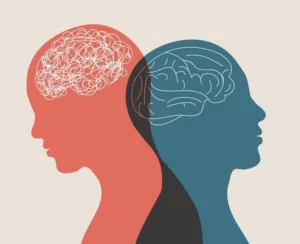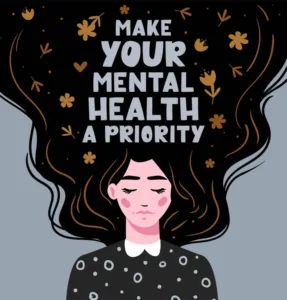Mental illness and prioritizing Mental Health: A Comprehensive Guide to Mental Health Awareness
Mental illness and prioritizing Mental Health: A Comprehensive Guide to Mental Health Awareness
In today’s fast-paced world, mental health awareness has become increasingly crucial. The prevalence of mental health disorders is on the rise, affecting people of all ages and backgrounds. Despite the progress made in reducing stigma surrounding mental health, there is still much work to be done to ensure that individuals receive the support and resources they need.
In this blog post, we will delve into the importance of mental health awareness, common mental health disorders, strategies for maintaining mental well-being, and resources for seeking help.

image credit pinterest
Understanding Mental Health
Mental health encompasses our emotional, psychological, and social well-being. It affects how we think, feel, and act, influencing how we handle stress, relate to others, and make choices. Mental health is essential at every stage of life, from childhood and adolescence through adulthood. Just as we prioritize our physical health, it is crucial to pay attention to our mental well-being.
The Importance of Mental Health Awareness
Mental health awareness plays a vital role in destigmatizing mental health disorders(Mental illness) and encouraging individuals to seek help. By promoting understanding and empathy, we can create a supportive environment where individuals feel comfortable discussing their mental health challenges. Increased awareness can also lead to early detection of mental health issues, allowing for timely intervention and treatment.

image credit pinterest
Common Mental Health Disorders(Mental illness)
Several mental health(Mental illness) disorders can impact individuals’ lives, ranging from anxiety and depression to bipolar disorder and schizophrenia. Anxiety disorders, characterized by excessive worry and fear, affect millions of people worldwide. Depression, marked by persistent feelings of sadness and loss of interest, is another prevalent mental health disorder. Bipolar disorder involves extreme mood swings, while schizophrenia can cause distorted thoughts and perceptions.
Bipolar disorder, formerly known as manic depression, is a mental health condition characterized by periods of depression and periods of abnormally elevated mood. Let’s delve into the details:
1. Symptoms:
– Depressive Episodes: During these periods, individuals may experience crying, have a negative outlook on life, and exhibit poor eye contact with others.
– Manic Episodes: When the elevated mood is severe or associated with psychosis, it is called mania. During mania, individuals behave or feel abnormally energetic, happy, or irritable. They often make impulsive decisions* with little regard for consequences. There is also a reduced need for sleep during manic phases.
– Hypomania: A less severe form of mania is called hypomania. It does not significantly affect functioning.

credit pinterest
2. Risk Factors:
– Genetics: Many genes, each with small effects, contribute to the development of bipolar disorder. Genetic factors account for about 70–90% of the risk.
– Environmental Factors: These include a history of childhood abuse and long-term stress.
3. Types of Bipolar Disorder(Mental illness):
– Bipolar I Disorder: At least one manic episode, with or without depressive episodes.
– Bipolar II Disorder: At least one hypomanic episode (no full manic episodes) and one major depressive episode.
– Cyclothymia: Hypomanic episodes with periods of depression that do not meet the criteria for major depressive episodes.
More you may like:
4. Complications:
– Suicide Risk: Over 20 years, 6% of those with bipolar disorder die by suicide, while 30–40% engage in self-harm.
– Associated Mental Health Issues: Anxiety disorders and substance use disorders are commonly linked to bipolar disorder.
5. Treatment Options:
– Medication: Mood stabilizers (e.g., lithium), antipsychotics, antidepressants, and antianxiety drugs.
– Psychotherapy: Includes interpersonal and social rhythm therapy, cognitive-behavioral therapy, and psychoeducation.
Remember that bipolar disorder is manageable with proper treatment and support. If you or someone you know is experiencing symptoms, seek professional help promptly.

image credit pinterest
Schizophrenia is a serious mental disorder that affects how people interpret reality. Here are some key points about it:
- Symptoms and Characteristics(Mental illness):
- People with schizophrenia may experience a combination of the following symptoms:
- Hallucinations: Perceiving things that are not real (e.g., hearing voices).
- Delusions: Holding false beliefs that are resistant to reason or evidence.
- Disordered Thinking: Thoughts that jump between unrelated topics or lack coherence.
- People with schizophrenia may experience a combination of the following symptoms:
-
-
- Disordered Behavior: Unusual actions or movements.
- Flat Affect: Reduced emotional expression.
- Agitation and Inappropriate Reactions.
- Lack of Pleasure or Interest in activities.
- Decreased Speech Output.
- These symptoms can significantly impair daily functioning.
-
- Causes:
- The exact causes of schizophrenia are not fully understood, but several factors contribute:
- Brain Chemistry: Abnormal functioning of neurotransmitters (such as dopamine) can play a role.
- Heredity: Schizophrenia tends to run in families.
- Brain Abnormalities: Structural changes or circuitry dysfunction.
- Complications During Pregnancy and Birth: Infections, malnutrition, or birth-related brain injury.
- The exact causes of schizophrenia are not fully understood, but several factors contribute:
- Diagnosis and Treatment(Mental illness):
- Diagnosis is based on clinical assessment, genetic background, and changes in mental state.
- There is no specific diagnostic test for schizophrenia.
- Treatment includes:
- Medications: Antipsychotics (e.g., Olanzapine, Risperidone).
- Psychotherapy: Psychoeducation or cognitive therapy.
- Electroconvulsive Therapy (ECT): Altering neurotransmitter levels.
- Family Counseling: To reduce stress and support the patient.
- Prevention:
- Preventing schizophrenia is challenging because not all of its causes are fully within our control. However, there are steps you can take to reduce the risk of developing or worsening symptoms. Let’s explore some strategies:
- Genetics and Family History:
- Genes play a significant role in schizophrenia risk. Having a family member with schizophrenia increases your chances, but it’s not a guarantee.
- Over 250 genetic components contribute to the risk, with each playing a small role. Together, they have a substantial impact.
- While you can’t change your genes, understanding your family history can help you stay vigilant.
- Environmental Factors:
- Although environmental factors don’t directly cause schizophrenia, they can influence its development:
- Pregnancy Complications: Infections, stress, preeclampsia, and depression during pregnancy may raise the risk.
- Birth Complications: Premature birth, low birth weight, and lack of oxygen can contribute.
- Early Life Trauma: Abuse, neglect, and accidents may play a role.
- Social Factors: Isolation, lack of income, and social support matter.
- Cannabis Use: High-potency cannabis, especially at early ages, increases risk.
- Methamphetamine Misuse: Avoiding drug abuse can reduce risk.
- Exposure to Certain Viruses: Some viruses may be linked to schizophrenia.
- Although environmental factors don’t directly cause schizophrenia, they can influence its development:
- Protective Factors:
- Early Intervention: Seek mental health support if you experience trauma, stress, or extreme stress. Early treatment can be protective.
- Avoid Substance Abuse: Heavy cannabis and methamphetamine use can exacerbate symptoms.
- Manage Stress: High stress levels increase the risk of psychotic episodes.
- Social Support: Strong social ties can act as a protective factor.
- Healthy Lifestyle: Prioritize self-care and healthy habits.
- Genetics and Family History:
- Preventing schizophrenia is challenging because not all of its causes are fully within our control. However, there are steps you can take to reduce the risk of developing or worsening symptoms. Let’s explore some strategies:

image credit pinterest
Strategies for Maintaining Mental Well-being
Taking care of our mental health is essential for overall well-being. Here are some strategies to support mental well-being:
- Self-Care and Stress Management:
- Prioritize self-care activities that help you relax and recharge. This includes getting enough sleep, eating nutritious meals, staying hydrated, and engaging in physical activity.
- Practice stress management techniques such as deep breathing, meditation, or progressive muscle relaxation.
- Social Connections:
- Cultivate meaningful relationships with friends, family, and colleagues. Social support is essential for mental well-being.
- Reach out to loved ones regularly, even if it’s just a quick chat or a virtual hangout.
- Mindfulness and Mind-Body Practices:
- Mindfulness meditation, yoga, and tai chi can help reduce stress and improve mental clarity.
- These practices encourage being present in the moment and can enhance overall well-being.
- Limit Exposure to Negative News and Social Media:
- Constant exposure to negative news can impact mental health. Stay informed, but also take breaks from news updates.
- Be mindful of your social media use. Unfollow accounts that cause stress or anxiety.
- Set Realistic Goals and Prioritize Tasks:
- Break down larger tasks into smaller, manageable steps. Celebrate small victories along the way.
- Avoid overcommitting yourself. Learn to say no when necessary.
- Engage in Hobbies and Creative Activities:
- Pursue activities that bring you joy, whether it’s painting, playing an instrument, gardening, or cooking.
- Creativity can be therapeutic and boost mental well-being.
- Seek Professional Help When Needed:
- If you’re struggling with persistent feelings of sadness, anxiety, or other mental health issues, don’t hesitate to seek professional support.
- Therapists, counselors, and psychiatrists can provide guidance and coping strategies.
Resources for Seeking Help
If you or someone you know is experiencing mental health challenges, it is essential to seek help. Here are some resources that can provide support:

A Comprehensive Guide to Mental Health Awareness
1. National Alliance on Mental Illness (NAMI):
The National Alliance on Mental Illness (NAMI) is a nationwide grassroots mental health organization dedicated to building better lives for the millions of Americans affected by mental illness. Here are some key points about NAMI:
- Mission and Purpose:
- NAMI’s mission is to provide support, education, and advocacy for individuals and families impacted by mental health conditions.
- It aims to reduce stigma, raise awareness, and improve access to mental health resources.
- Origins and Growth:
- NAMI began as a small group of families who gathered around a kitchen table in 1979.
- Over time, it has evolved into the leading voice on mental health in the United States.
- Activities and Services:
- Educational Programs: NAMI offers educational programs to help individuals understand mental health conditions, cope with challenges, and support their loved ones.
- Advocacy: NAMI advocates for policy changes that benefit people living with mental illness and their families.
-
- Helpline: The NAMI HelpLine provides one-on-one assistance and information to address tough challenges faced by individuals, families, and friends dealing with mental health issues.
- NAMICon: NAMI hosts conferences like NAMICon, bringing together experts, advocates, and community members to share knowledge and experiences.
- Get Involved:
- Fundraise: While not everyone can give, anyone can fundraise. NAMI relies on contributions from supporters across the country to advocate, educate, and raise awareness.
- Volunteer: Join NAMI’s grassroots efforts to make a difference.
- NAMIWalk: Participate in NAMIWalk events to raise funds and awareness.
- Become a Fundraiser: Encourage others to support NAMI’s critical work.
- NAMI HelpLine:
- The NAMI HelpLine provides essential support and information to those facing mental health challenges.
- You can call, text, or chat with the HelpLine during specific hours, and there’s also a crisis service available 24/7.
Crisis Text Line: Text “HELLO” to 741741 to connect with a crisis counselor for free, 24/7 support.
Therapy apps: Apps like Talkspace and BetterHelp offer online therapy services for convenient access to mental health support.
Local mental health services: Contact your local mental health clinic or community center for information on available resources and support groups.
Bollywood celebrities often face unique challenges that can impact their mental health. Let’s explore some of the reasons why they might experience mental health issues:
- Pressures of Looking Good:
- The film industry places immense demands on stars to maintain a flawless appearance. Actors and actresses face social pressure to look picture-perfect at all times.
- Even minor imperfections can create stress, leading some celebrities to undergo cosmetic surgeries or treatments.
- Work Pressures:
- Bollywood film schedules are incredibly busy, with long hours and tight deadlines. The constant workload can be mentally exhausting.
- The pressure to excel not only in performance but also in appearance adds to the stress.
- Coping with Failure:
- The entertainment industry is highly competitive. Rejections, criticism, and failures can take a toll on mental well-being.
- Not being selected for a role or facing setbacks can lead to feelings of inadequacy and depression.
- Family History and Personal Battles:
- Some celebrities come from families with a history of mental health issues. Genetic factors can play a role.
- Additionally, personal struggles, relationship challenges, and emotional trauma can contribute to mental health difficulties.
Yoga is a holistic practice that originated in ancient India and has evolved over thousands of years. It combines physical postures (asanas), breathing exercises (pranayama), meditation, and relaxation techniques to promote overall well-being.
Yoga in Mental health:
Yoga has gained recognition for its positive impact on mental health. Let’s explore how yoga benefits mental well-being:

image credit pinterest
- Reduced Anxiety and Depression:
- Yoga emphasizes breathing practices and meditation, which help calm and center the mind.
- Studies show that regular yoga practice can lead to reduced anxiety and depression.
- Brain Health and Cognitive Skills:
- Yoga not only strengthens the body but also benefits the brain.
- Brain imaging studies reveal that yoga practitioners have a thicker cerebral cortex (responsible for information processing) and hippocampus (involved in learning and memory) compared to nonpractitioners.
- These brain areas typically shrink with age, but yoga seems to counteract this decline, supporting memory and cognitive skills.
- Elevated Mood and Emotional Regulation:
- Yoga affects mood by increasing levels of gamma-aminobutyric acid (GABA), associated with better mood and reduced anxiety.
- Meditation during yoga practice reduces activity in the limbic system (the emotional center of the brain), leading to more balanced emotional responses.
- Complementary Treatment for Mental Health Disorders:
- Research highlights the benefits of yoga for addressing symptoms of depression and posttraumatic stress disorder (PTSD).
- Yoga is comparable to other treatments, such as medication and psychotherapy, and has fewer side effects.
- Holistic Mental Healthcare:
- Yoga can be a valuable community-based intervention, promoting mental well-being and preventing mental illness.
Here are the answers to the 20 FAQs on mental healthcare:
- What is mental healthcare? Mental healthcare refers to the range of services and support systems designed to promote mental well-being, prevent mental illness, and treat mental health conditions.
- What are the most common mental health conditions? Common mental health conditions include depression, anxiety disorders (such as generalized anxiety disorder, social anxiety disorder, and panic disorder), bipolar disorder, schizophrenia, and post-traumatic stress disorder (PTSD).
- What are the signs and symptoms of mental illness? Signs and symptoms of mental illness vary depending on the condition but may include persistent sadness, changes in mood or behavior, social withdrawal, difficulty concentrating, changes in sleep or appetite, and thoughts of self-harm or suicide.
- How is mental illness diagnosed? Mental illness is typically diagnosed through a combination of clinical assessments, interviews, and standardized tests conducted by mental health professionals such as psychiatrists, psychologists, or licensed therapists.
- What are the treatment options for mental health conditions? Treatment options for mental health conditions may include medication, therapy (such as cognitive-behavioral therapy or psychotherapy), support groups, lifestyle changes, and alternative or complementary therapies.
- What is the role of medication in treating mental illness? Medication can be used to alleviate symptoms of mental illness, such as antidepressants for depression or mood stabilizers for bipolar disorder. It is often used in conjunction with therapy and other forms of treatment.
- How effective is therapy in treating mental health conditions? Therapy has been shown to be highly effective in treating various mental health conditions by helping individuals develop coping strategies, improve problem-solving skills, and gain insight into their thoughts and behaviors.
- What are some self-care strategies for maintaining mental well-being? Self-care strategies for maintaining mental well-being include regular exercise, healthy eating, adequate sleep, stress management techniques (such as mindfulness or relaxation exercises), setting boundaries, and engaging in enjoyable activities.
- How can I support a loved one who is struggling with mental illness? Supporting a loved one with mental illness involves offering empathy, understanding, and encouragement, listening non-judgmentally, educating yourself about their condition, and helping them access professional help and support resources.
- What is the difference between a psychiatrist, psychologist, and therapist? Psychiatrists are medical doctors who specialize in mental health and can prescribe medication. Psychologists have advanced degrees in psychology and provide therapy and assessment services. Therapists are trained professionals who provide various forms of therapy to individuals, couples, or families.
- Is mental illness hereditary? There is evidence to suggest that genetics can play a role in the development of certain mental health conditions, but environmental factors also contribute significantly.
- Can mental health conditions be prevented? While some risk factors for mental illness cannot be controlled, such as genetics, many protective factors and preventive strategies, such as stress management, healthy lifestyle choices, and early intervention, can reduce the risk of developing mental health conditions.
- What are the stigmas surrounding mental illness, and how can they be addressed? Stigmas surrounding mental illness include misconceptions, discrimination, and negative attitudes toward individuals with mental health conditions. Addressing stigma involves raising awareness, challenging stereotypes, promoting understanding, and advocating for equality and inclusion.
- How does stress impact mental health? Chronic stress can contribute to the development or exacerbation of mental health conditions such as anxiety and depression by disrupting neurotransmitter function, increasing inflammation, and affecting brain structure and function.
- Are there lifestyle changes that can improve mental well-being? Yes, lifestyle changes such as regular exercise, healthy eating, adequate sleep, social connections, stress management techniques, and avoiding substance abuse can all contribute to improved mental well-being.
- What is the relationship between mental health and physical health? Mental health and physical health are closely interconnected, with each influencing the other. Poor mental health can negatively impact physical health and vice versa. Taking care of both aspects is essential for overall well-being.
- How does trauma affect mental health? Trauma can have profound and long-lasting effects on mental health, leading to conditions such as PTSD, depression, anxiety disorders, and substance abuse. It can also impact relationships, self-esteem, and overall functioning.
- What resources are available for individuals in a mental health crisis? Resources for individuals in a mental health crisis include hotlines, crisis intervention services, emergency rooms, mobile crisis teams, and supportive friends or family members. It’s important to seek help immediately if you or someone you know is in crisis.
- How can I find a mental health professional that suits my needs? You can find a mental health professional by asking for recommendations from your primary care physician, researching online directories, contacting your insurance provider for a list of covered providers, or seeking referrals from friends or family members.
- Are there alternative or complementary treatments for mental health conditions? Yes, there are alternative or complementary treatments for mental health conditions, such as acupuncture, yoga, meditation, mindfulness-based therapies, art therapy, and herbal supplements. It’s important to discuss these options with a healthcare professional before trying them.
Conclusion:
Mental health awareness is a critical component of overall well-being. By understanding mental health disorders, promoting empathy and support, and prioritizing self-care, we can create a more compassionate and inclusive society.
Remember, your mental health matters, and seeking help is a sign of strength, not weakness. Together, we can work towards a world where mental health is prioritized and supported for all individuals. Let’s continue to raise awareness, reduce stigma, and advocate for mental health resources to create a healthier and more resilient community.
More page that you can visit: https://taazakhobor.in/
More you can read:
https://deepblogs.net/entrepreneurship-in-the-metaverse/
Hair transplant procedure in 2024. Does hair transplant work??
The Science of Laughter: How Humor Impacts Our Mental and Physical Health
How to start a gym business in 2024. The most profitable business. Don’t miss at all!!
How to lose weight in 3 months





